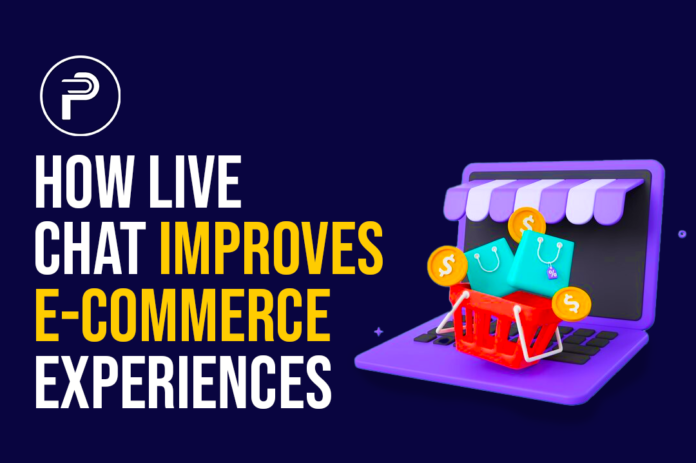Effective communication is a fundamental pillar of successful e-commerce brands. Whether you’re managing a well-established e-commerce business, a small start-up, or a casual side hustle, this hold true. This is why live chat functionality has rapidly become a must-have feature for online retailers. Here are the key benefits of live chat for driving e-commerce success.
Live Chat Functionality
Must Read:Strengthening Customer Relationship Management with the power of AI
If you spend much time online, especially on e-commerce websites, you’ve likely encountered live chat features. These might appear as pop-ups shortly after landing on a website or be located within the customer support section.
Live chat team members handle various tasks, including facilitating sales, resolving issues, and answering common customer questions. This is made possible through chat software integrated into the website or app.
While traditional call center phone systems can often frustrate customers, live chat services are specifically designed to address these shortcomings. But how exactly do they work?
In essence, live chat functions like any other instant messaging service. The key difference is that a customer’s initial message is queued and directed to a team member. Once the connection is established, it becomes a straightforward conversation.
Most live customer service chats are managed by real people, known as chat agents. However, many companies are beginning to incorporate AI-driven chat systems to enhance efficiency. Even so, human agents are typically the preferred choice for personalized customer interactions.
Comparing Live Chat To Other Methods
This approach to sales and support has rapidly gained popularity among businesses aiming to connect with modern consumers and enhance customer engagement. However, to fully appreciate the benefits of live chat for e-commerce platforms, it’s helpful to consider what came before.
Before live chat became widespread, customers with questions or issues typically had three options:
– Visiting a physical store to speak with someone in person.
– Calling a customer service phone line.
– Sending an email to customer support.
Each of these methods had significant drawbacks. Visiting a physical location required substantial effort, especially for products purchased online. Phone lines often involved long wait times and navigating frustrating automated menus before reaching a real person. Making a mistake in the process could mean starting over, adding to the frustration.
Emails posed their own challenges. Queries were assigned ticket numbers and placed in a queue, leaving customers waiting for hours, days, or even weeks for a response. Any follow-up questions meant starting the entire waiting process again.
In theory, chat software eliminates these delays and obstacles. To understand how it accomplishes this, let’s explore the specific benefits of live chat for e-commerce businesses.
5 Importance of Live Chat For E-commerce Businesses

Today, most top-tier contact management software includes a live chat feature, offering significant benefits for businesses. Let’s explore the advantages live chat can bring, some of which may be obvious, while others might surprise you. Leveraging these benefits will help your chat agents provide exceptional service, fostering both customer satisfaction and loyalty.
1. Faster Response Times
One of the primary appeals of live chat is its ability to bypass the delays of traditional support channels. Unlike email or phone lines, live chat enables near-instant communication, making it easier for customers to get answers to simple questions or resolve complex issues in real-time.
When resolving problems becomes a hassle, customers often disengage from the brand entirely. Live chat minimizes this frustration, helping ensure a smoother, more satisfactory customer experience.
2. Enhanced Customer Control
Live chat reduces passive waiting and empowers customers to take control of their journey. Interacting directly with an agent who provides insights and solutions gives customers a sense of ownership in the process.
Psychologically, a sense of control mitigates frustration and encourages customers to see the resolution process through. This increases the likelihood of ending interactions on a positive note, strengthening customer relationships.
3. Effortless Documentation
A key advantage of live chat is that conversations are automatically documented, providing a clear record for both customers and support agents. Unlike phone calls, chat logs can be easily accessed by users, and unlike emails, they remain focused within a dedicated support channel, reducing the risk of being lost in a crowded inbox.
These records ensure continuity, saving both parties from having to repeat information, which improves efficiency and reduces frustration.
4. Additional Sales Channel
Live chat isn’t just for support,it’s an increasingly popular sales tool. According to Finance Online, live chat is used for sales by:
– 85% of B2B companies.
– 74% of B2C companies.
Chat sessions can complement the browsing experience or even allow agents to complete transactions directly. Modern customers value an omnichannel approach, making live chat a powerful tool for boosting conversion rates and staying competitive in the market.
5. Round-the-Clock Accessibility
Limited operating hours can be a major barrier for customers seeking support. Live chat makes it easier to provide 24/7 service, ensuring customers can reach assistance whenever they need it. This can be achieved by:
– Employing remote staff across different time zones.
– Outsourcing to external live chat teams.
– Using AI chatbots to handle inquiries outside regular hours.
Even for small startups or solo entrepreneurs, outsourcing or incorporating AI can provide round-the-clock support, demonstrating the importance of seeking expert help when needed.
By implementing live chat effectively, businesses can enhance customer experiences, boost sales, and remain accessible, ensuring long-term success in an increasingly competitive e-commerce landscape.
Conclusion
When a more convenient solution is introduced, it doesn’t take long for people to adapt. What begins as a unique advantage for one e-commerce business quickly becomes an expected standard, with companies facing criticism for not offering it. Live chat is rapidly becoming as essential to e-commerce platforms as the shopping cart button.
Fortunately, even if you don’t have an in-house chat software solution, B2B service providers make implementation simple. Once your live chat system is in place, you can shift your focus to what truly matters,collaborating with your team to deliver outstanding customer service.

